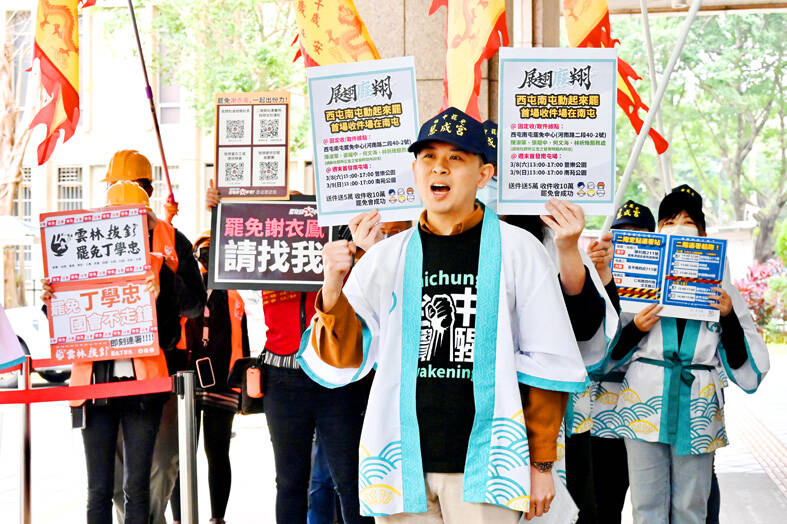Advocates to recall Chinese Nationalist Party (KMT) lawmakers in central Taiwan yesterday went to the Central Election Commission’s (CEC) office in Taipei to collect petition forms for the second stage of their recall campaign.
As of yesterday, 32 recall proposals against KMT lawmakers, two against Democratic Progressive Party (DPP) Nantou County councilors and one against suspended Hsinchu Mayor Ann Kao (高虹安) had passed their first-phase review.
Campaigners yesterday picked up second-stage petition forms to recall KMT lawmakers based in Taichung, Yunlin County and Changhua County; namely, Ting Hsueh-chung (丁學忠), Yen Kuan-heng (顏寬恒), Yang Chiung-ying (楊瓊瓔), Liao Wei-hsiang (廖偉翔), Huang Chien-hao (黃健豪) and Lo Ting-wei (羅廷瑋).

Photo: George Tsorng, Taipei Times
The second stage of the petition to recall KMT Changhua County Legislator Hsieh Yi-feng (謝衣鳳) would not begin until Friday next week, as campaigners have not yet collected petition forms.
Dentist Shih Shu-hua (史書華), head of the campaign to recall New Taipei City KMT Legislator Yeh Yuan-chih (葉元之), also picked up second-stage petition sheets from the CEC yesterday.
Twelve recall petitions against DPP lawmakers failed to meet the required signatures for the first stage, but KMT Youth League member Lee Hsiao-liang (李孝亮) yesterday submitted 2,637 supplementary signatures for the recall of DPP Legislator Wu Pei-yi (吳沛憶).
Meanwhile, DPP spokesman Justin Wu (吳崢) and attorney Huang Di-ying (黃帝穎) yesterday at the Taipei District Prosecutors’ Office filed charges against the KMT for including petition signatures of dead people.
In response, Lee said that recall groups could not know whether a petitioner is dead or alive solely from their signature.
The CEC in a statement reiterated that local household registration offices are responsible for reviewing such reports and identifying petition signatures of dead people.
Their review results would next be handed to local election committees for initial review, with confirmed cases reported to the CEC for final review, it said.

A small number of Taiwanese this year lost their citizenship rights after traveling in China and obtaining a one-time Chinese passport to cross the border into Russia, a source said today. The people signed up through Chinese travel agencies for tours of neighboring Russia with companies claiming they could obtain Russian visas and fast-track border clearance, the source said on condition of anonymity. The travelers were actually issued one-time-use Chinese passports, they said. Taiwanese are prohibited from holding a Chinese passport or household registration. If found to have a Chinese ID, they may lose their resident status under Article 9-1

Taiwanese were praised for their composure after a video filmed by Taiwanese tourists capturing the moment a magnitude 7.5 earthquake struck Japan’s Aomori Prefecture went viral on social media. The video shows a hotel room shaking violently amid Monday’s quake, with objects falling to the ground. Two Taiwanese began filming with their mobile phones, while two others held the sides of a TV to prevent it from falling. When the shaking stopped, the pair calmly took down the TV and laid it flat on a tatami mat, the video shows. The video also captured the group talking about the safety of their companions bathing

A classified Pentagon-produced, multiyear assessment — the Overmatch brief — highlighted unreported Chinese capabilities to destroy US military assets and identified US supply chain choke points, painting a disturbing picture of waning US military might, a New York Times editorial published on Monday said. US Secretary of Defense Pete Hegseth’s comments in November last year that “we lose every time” in Pentagon-conducted war games pitting the US against China further highlighted the uncertainty about the US’ capability to intervene in the event of a Chinese invasion of Taiwan. “It shows the Pentagon’s overreliance on expensive, vulnerable weapons as adversaries field cheap, technologically

Starting on Jan. 1, YouBike riders must have insurance to use the service, and a six-month trial of NT$5 coupons under certain conditions would be implemented to balance bike shortages, a joint statement from transportation departments across Taipei, New Taipei City and Taoyuan announced yesterday. The rental bike system operator said that coupons would be offered to riders to rent bikes from full stations, for riders who take out an electric-assisted bike from a full station, and for riders who return a bike to an empty station. All riders with YouBike accounts are automatically eligible for the program, and each membership account